Affiliate links on Android Authority may earn us a commission. Learn more.
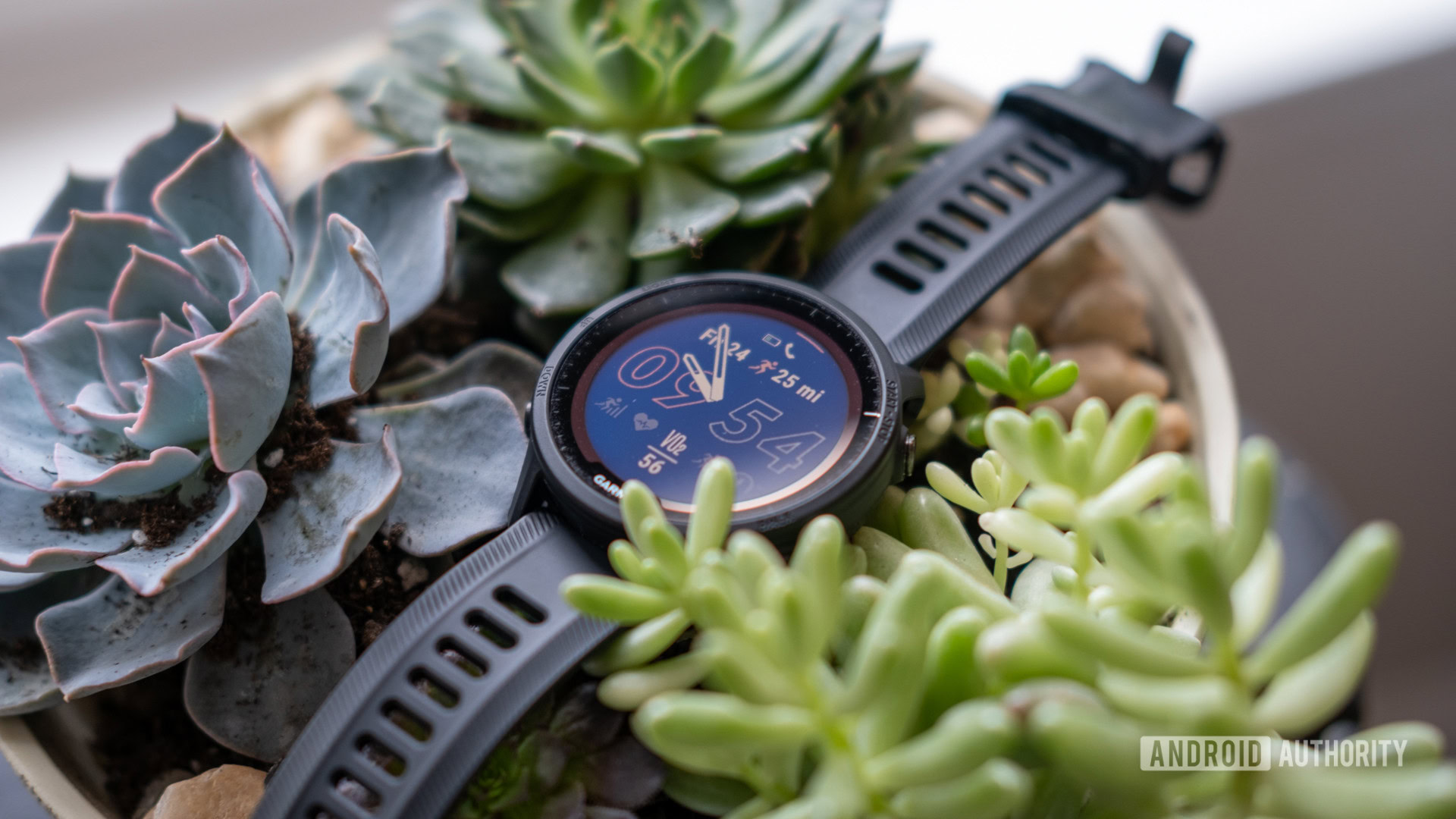

Garmin Forerunner 955 review: King of the road

Garmin Forerunner 955
MSRP:
What we like
What we don't like

Garmin Forerunner 955
Have you ever visited an automotive website to build and price a car? It doesn’t matter if you’re actually in the market for one. Sometimes, it’s just fun to see how many extras you can add. Now, shrink that supercar down to fit on your wrist. That’s Garmin’s approach with the Forerunner 955 series, its latest flagship running watch. Of course, a feature set as long as the Forerunner 955 series’ has a top-trim price tag to match. Find out if the miles are worth the cost in our Garmin Forerunner 955 review.
Update, May 2023: We’ve added information about recent software updates and new alternatives to the Forerunner 955.
What you need to know about the Garmin Forerunner 955
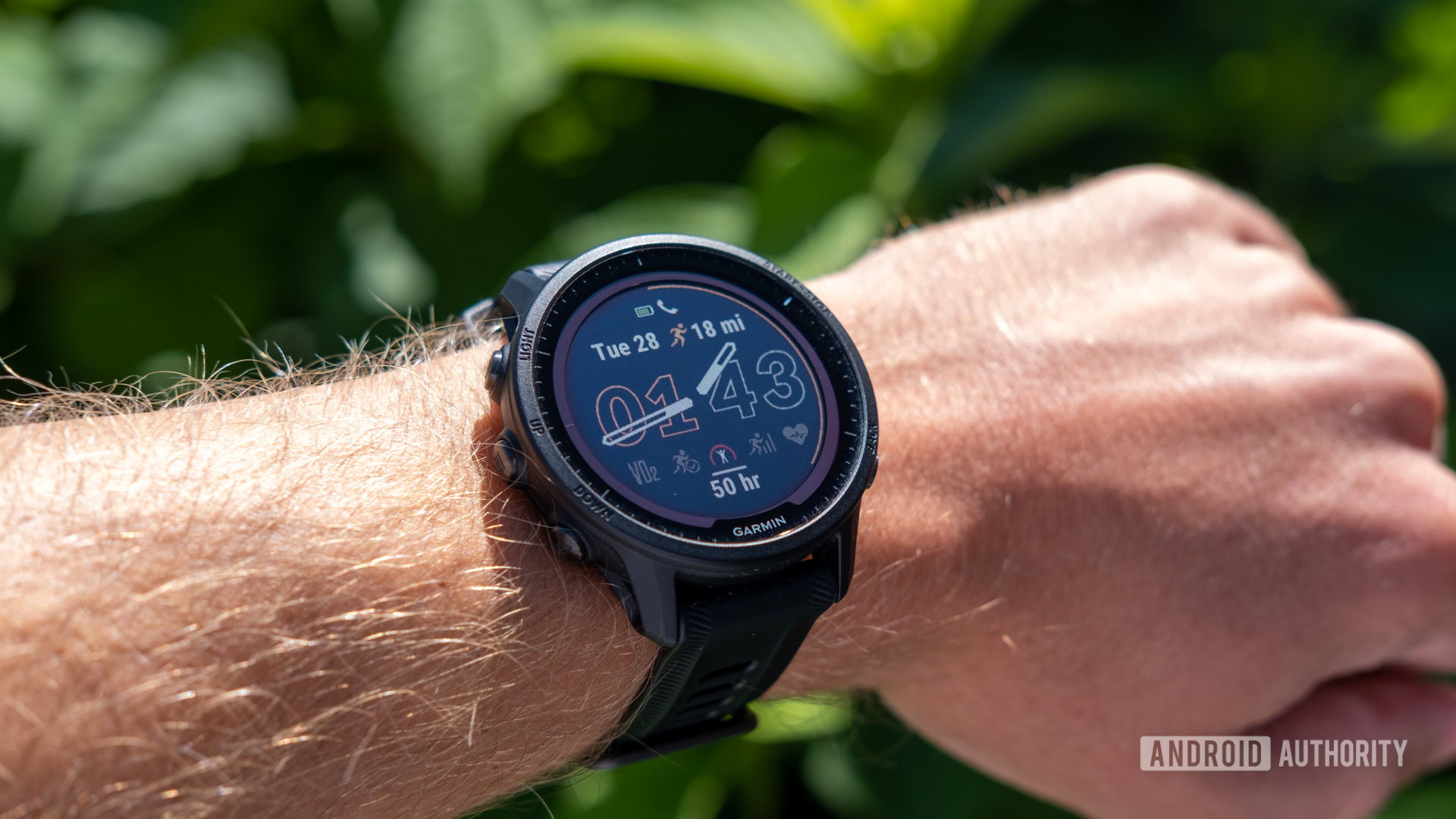
- Garmin Forerunner 955: $499 / £479 / €549
- Garmin Forerunner 955 Solar: $599 / £549 / €649
The Garmin 955 series launched at the start of June 2022 as premium fitness-focused successors to 2019’s Forerunner 945. It retains most of the design traits of the previous models, but Garmin has added a few new wrinkles to the setup. While you won’t find an LTE-connected version on the market yet, the Forerunner 955 is available in both standard and solar-powered configurations. We tested the solar version, but the two watches are essentially identical aside from the titular solar charging functionality.
No matter which way you go, the Garmin Forerunner 955 packs a 1.3-inch Gorilla Glass DX touchscreen display with a 260 x 260 resolution. The only difference is that the Forerunner 955 Solar packs a thin — but noticeable — ring around the display to soak up ambient solar energy. Both watches embrace a black or Whitestone fiber-reinforced polymer bezel with a durable, waterproof 22mm silicone strap and Garmin’s traditional five-button setup. It’s nearly the same design as the Forerunner 255 sports, but you won’t find as many fun colors on Garmin’s top-of-the-line watch.
The Forerunner 955 feels luxurious from top to bottom, with a thin ring for solar energy and a 1.3-inch full-color touchscreen.
Great solar power brings great responsibility, or at least a significant bump in battery life. The traditional Garmin Forerunner 955 is rated for up to 15 days of juice in smartwatch mode, with up to 42 hours of GPS tracking without music controls. The Forerunner 955 Solar, on the other hand, offers up to 20 days in smartwatch mode, with up to 49 hours of GPS tracking without music. To achieve those figures, however, Garmin expects you to spend about three hours in direct sunlight per day — not always an easy task depending on where you live and the time of year.
As you’d expect, the Garmin Forerunner 955 packs a bevy of upgraded sensors to track every metric you could ask for. It carries a barometric altimeter and a gyroscope and picked up the same fourth-generation Elevate sensor as the excellent Forerunner 255. This should offer more accurate measurements throughout the day as well as raw heart rate variability (HRV) data, which we’ll come back to later. In addition to GPS, GLONASS, and GALILEO navigation tracking, the Forerunner 955 series also has multi-frequency reception for better signal in covered and remote areas.
Some of Garmin’s dedicated training modes include gym activities like bouldering, yoga, rowing, and elliptical training. If you’re mainly interested in running, the Forerunner 955 supports seven disciplines, including trail and ultra running. The outdoor recreation modes are even more specific, with dedicated modes for niche sports like stand-up paddleboarding. We didn’t have the time — or resources — to use every single activity during our review, but it’s tough to find one that Garmin skipped.
While music is an optional feature for Garmin’s more affordable GPS watches, it’s baked right into the Forerunner 955 series. The watches offer space to tote 2,000 songs on your wrist with up to 32 apps. You can also download running routes in case you’re in a new, unfamiliar city. The Forerunner 955 and Forerunner 955 Solar also support NFC, so you can easily make purchases with Garmin Pay even when away from your phone.
As usual, the Forerunner 955 is compatible with Android and iOS via Bluetooth, but you’ll need the Garmin Connect app. It’s your hub for updates and watch preferences and a must-have to sync workouts with your phone. If you’re interested in downloading different watch faces, you’ll need the Connect IQ store, a Garmin-specific app store. You’ll also need the Connect app to manage updates to the Forerunner 955, but Garmin’s support thus far has been excellent. The Forerunner 955 has received multiple upgrades, reaching version 12.27 with newfound support for additional accessories and satellite tracking modes.
The Garmin Forerunner 955 Solar we tested comes in a relatively simple package, complete with a charging cable and a startup guide. You can also find a more in-depth owner’s manual online. It’s about 140 pages long and covers each of the Garmin Forerunner 955’s dedicated training modes.
Both the Forerunner 955 and Forerunner 955 Solar are available to buy from Garmin, as well as Amazon and other third-party retailers.
What’s good?

Like a proper high-end vehicle, the Garmin Forerunner 955 offers more than most people need. It covers all of the bases in a refined, comfortable package. There’s no need to balance the cost of adding music controls like with some other Garmin running watches — they’re already included. The only choices you have to make with the Forerunner 955 is whether you want solar charging and if you prefer a black or a Whitestone case.
While there are quite a few features to set the Forerunner 955 far above its close Forerunner 255 sibling, some of those they share are the most important. This includes support for the Morning Report, which first debuted on the Garmin Lily. The feature delivers a daily update on your sleep, recovery, and suggested training for the day. The training recommendations grow and learn based on your previous efforts, and the Forerunner 955 will also recommend rest days if your load is too high.
Each Morning Report is an excellent opportunity to take full advantage of Garmin’s updated fourth-generation Elevate sensor. It’s a brand-new heart rate sensor with improved accuracy and almost-constant readings. I found it matched well against my Polar H10 chest strap, which is good news for a wrist-mounted heart rate sensor. The new Elevate sensor also offers HRV data. This measures the change in the time between heartbeats and can indicate fluctuating stress levels. It’s a complicated topic, but you can check out our explainer if you want to learn more.
The Forerunner 955 offers everyday conveniences like Garmin Pay and music playback, but the extras set it apart. For example, the Forerunner 955 offers Topo Active map support, where you can download a detailed map of your region and use it to navigate runs and bike rides. I didn’t need map support while running around my hometown, but it showed its value on a recent trip to Chicago. The Topo Active map populates with points of interest and navigation suggestions to neighborhoods in the city — a helpful feature when you’re in a new place and fancy a run.
The Forerunner 955 Solar picks up all the upgraded sensors from the Forerunner 255 and adds bonus features like solar charging and Topo Active map support.
As you might expect with the solar-powered version of the watch, the battery life is excellent. It’s not quite level with the solar models of the Garmin Instinct 2, which can last forever given enough juice, but I was nearly able to match Garmin’s 20-day claim. I charged it the day it arrived and only had to open up the included charging cable about 17 days later. I noticed that the battery seems to drain quickly on the first day after a charge, but then it levels out, and the solar charging helps to recapture some charge. Garmin recommends about three hours of sunlight per day, and I found that was ample time to recapture the 4-8% I lost on an average run.
The Forerunner 955 Solar is the type of GPS watch that gets better the more you use it. Not only because you’ll gather more solar charge that way, but because there are so many activities to try. The watch offers more than 30 tracking types, and it’s tough to get through them all. I consider myself a pretty active person, yet I only used about five of the activities. Running made up most of my testing, but I also put hiking, golf, and bouldering through their paces. I was particularly impressed by the bouldering option, as it’s not just a retread of the indoor climbing feature. Instead, it’s geared for the low-height, high-strain effort that ropeless bouldering requires. There’s even a workout mode for Pickleball. I didn’t use it, but I’m sure any grandparent in the market for a new GPS watch will be excited.
The Forerunner 955’s golf support deserves a mention all its own. You can download more than 42,000 different courses to your watch, and I was surprised by a few of the options. There’s a small course near my house with an executive course and a pitch and putt, and Garmin had it mapped out and ready to go. Of course, you have to download a separate Garmin Golf app to make the most out of the feature, but it’s worthwhile for avid golfers.
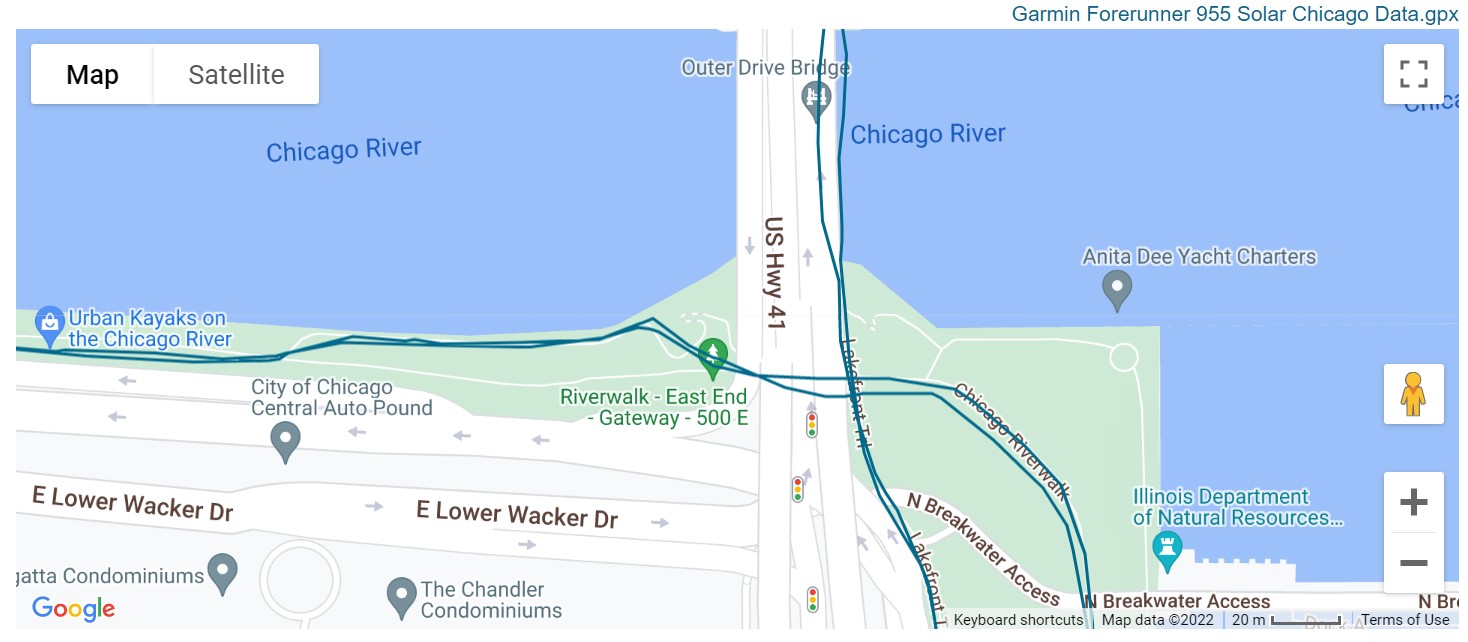
In my experience, the Garmin Forerunner 955 offered excellent accuracy across all metrics. The location tracking was accurate, even in the concrete heights of Chicago, as seen in the map above. There are a few points where the trail appears to put me in traffic, but a higher bridge covers the running path. More importantly, the stretch where I crossed under the highway is accurate in both directions.
I don’t have any complaints about the cadence or heart rate. The only spots where my cadence fell off were points where I had to wait to cross a street as expected. My heart rate reading was also close to my Polar H10, though it was a bit higher than usual due to the heat. However, the dip in my heart rate around 18 minutes matches with one of the dips in my cadence, which speaks to the accuracy of Garmin’s setup.
Two of Garmin’s more interesting metrics — Training Readiness and Body Battery — can be tough to tell apart. However, each has its purpose and benefit once you figure them out. Body Battery is an overall metric that rates your readiness for the day. It recharges overnight and drains throughout the day, depending on your workload. On the other hand, Training Readiness measures how hard you’re working and determines how much effort you should exert. It’s similar to Body Battery but just for workouts. It pulls HRV data, recovery information, and your previous activities to rate on a scale from Detraining to Overreaching.
While the Forerunner 955 Solar often decided that my Training Readiness climbed well into overreaching, I think that’s the more helpful metric of the pair. It drains and adjusts as a result of your activity and provides a rest period before you should dive back in. Body Battery, on the other hand, provides a number between one and 100, and it can be tough to know what the reading really means for your day. I found myself wondering what to do if I woke up to a Body Battery number of 62 because it doesn’t really expand on the reading.
What’s not so good?
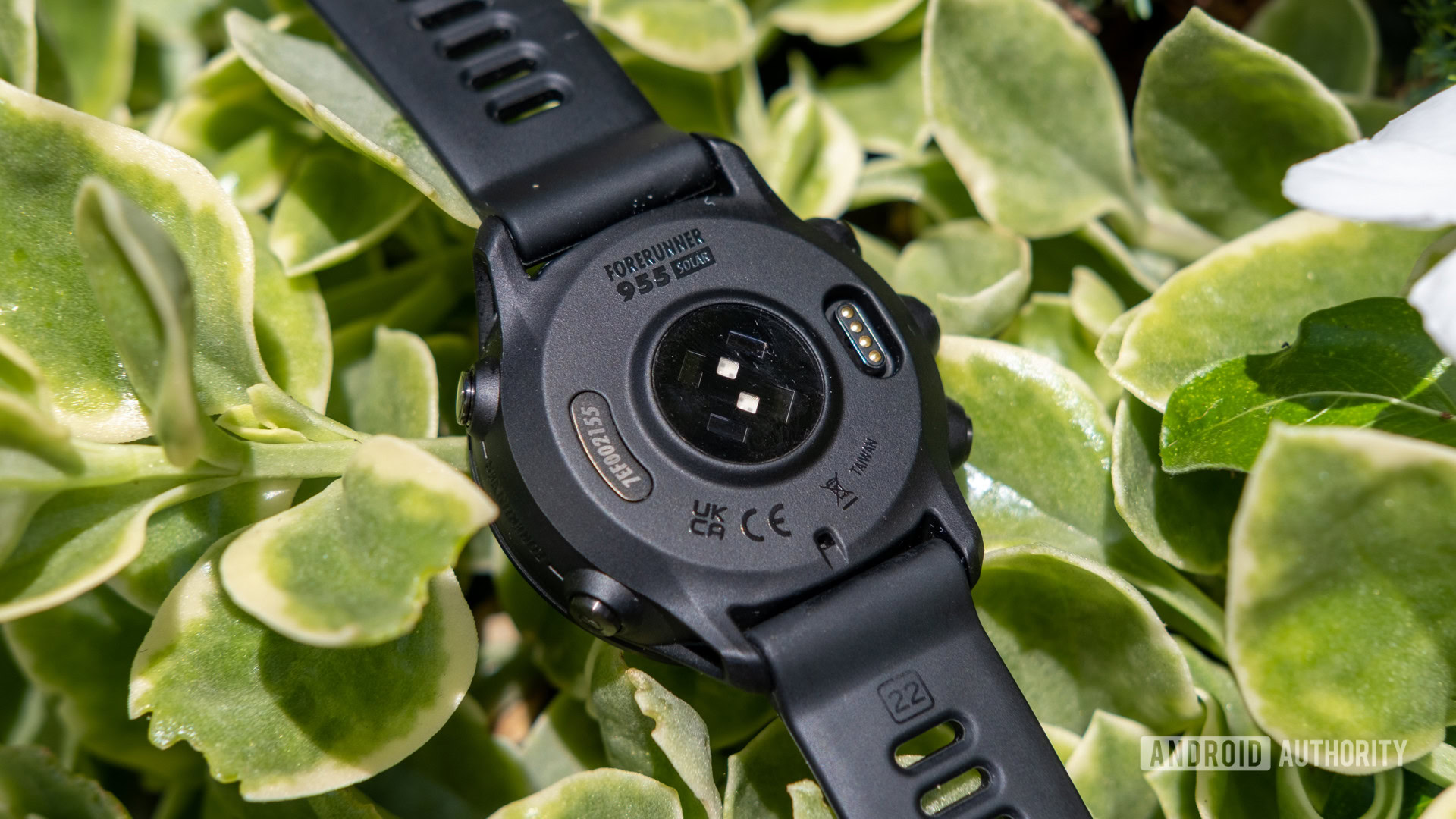
Finding flaws with the Garmin Forerunner 955 series is like buying a Ferrari and complaining that it doesn’t come in pink or costs too much. There are small nit-picks here and there, but nothing is approaching a dealbreaker. One of my few complaints is more of an issue with wearables as a whole than with Garmin itself.
We’ll start there: why are proprietary charging cables still a thing in 2022? The Forerunner 955 and Forerunner 955 Solar rely on the same four-pin connector as all other Garmin GPS watches, and it’s only compatible with USB-A chargers. At the very least, we’d have expected Garmin to move to USB-C by this point or adopt wireless charging. The included charger has no problems staying connected to the watch, but it feels like a dated choice.
When you pick up a new smartwatch (other than the Apple Watch), it’s common to find a set of quick release bands. They feature a small nub, so you can easily pop them off and swap for another set of bands. You’ll find such a band on Garmin’s Forerunner 55 and even the Forerunner 255 with which the 955 shares a lot of DNA. However, there are no quick release bands for the Forerunner 955 duo. Instead, you have to arm yourself with a flathead screwdriver to pop the bands out and replace them. You can use any 22mm bands once you make the first swap, but it’s still a headache.
Quick release bands are about as common as proprietary charging cables on fitness watches, yet Garmin decided to skip them for the Forerunner 955.
I’ve previously lamented Garmin’s five-button setup. It often feels like more buttons than you need, but I’ll admit it’s growing on me. Now, Garmin has added a touchscreen to the Forerunner 955. It’s a nice smartwatch-level touch, but I sweat enough while working out that the touchscreen doesn’t always respond to my fingertips, and it’s certainly not helpful for avid swimmers. Ultimately, I turned to the reliable button setup whenever I needed a workout mode.
The touchscreen is more helpful when using the Forerunner 955 as a smartwatch, but I’d rather have one set of controls for all situations. Had Garmin chosen either buttons or a touchscreen, it probably could have pushed the battery even further than the almost three weeks I managed with the Solar model.
My only performance-based issue with the Forerunner 955 is that a few advanced metrics take a long time to get into gear. For example, HRV takes about three weeks of consistent wear to develop a confident reading. I also found that the Training Readiness reading took more than a week to adjust to my current abilities. It’s generally convinced that I’m overworking when I’m training at a regular rate. This could probably be mitigated by importing existing fitness data from other platforms, but that doesn’t seem to be an option.
Garmin Forerunner 955 specs
| Garmin Forerunner 955 | Garmin Forerunner 955 Solar | |
|---|---|---|
Display | Garmin Forerunner 955 1.3-inch MIP 260 x 260 resolution | Garmin Forerunner 955 Solar 1.3-inch MIP 260 x 260 resolution |
Dimensions and weight | Garmin Forerunner 955 46.5 x 46.5 x 14.4mm 52g w/o strap Fits wrists 130-220mm | Garmin Forerunner 955 Solar 46.5 x 46.5 x 14.4mm 53g w/o strap Fits wrists 130-220mm |
Colors and materials | Garmin Forerunner 955 Corning Gorilla Glass DX display Fiber-reinforced polymer bezel Silicone strap Black or Whitestone | Garmin Forerunner 955 Solar Corning Gorilla Glass DX display Fiber-reinforced polymer bezel Silicone strap Black or Whitestone |
Battery | Garmin Forerunner 955 Up to 15 days in smartwatch mode Up to 42 hours in GPS mode without music Up to 8.5 hours in all-systems GNSS mode with music | Garmin Forerunner 955 Solar Up to 20 days with solar Up to 49 hours with solar Up to 8.5 hours in all-systems GNSS mode with music |
Sensors | Garmin Forerunner 955 GPS GLONASS GALILEO Multi-Frequency Positioning Garmin Elevate Barometric Altimeter Compass Gyroscope Accelerometer Thermometer Pulse Ox Blood Oxygen Saturation Monitor | Garmin Forerunner 955 Solar GPS GLONASS GALILEO Multi-Frequency Positioning Garmin Elevate Barometric Altimeter Compass Gyroscope Accelerometer Thermometer Pulse Ox Blood Oxygen Saturation Monitor |
Durability | Garmin Forerunner 955 5ATM | Garmin Forerunner 955 Solar 5ATM |
Connectivity | Garmin Forerunner 955 NFC Bluetooth | Garmin Forerunner 955 Solar NFC Bluetooth |
Compatibility | Garmin Forerunner 955 Android and iOS | Garmin Forerunner 955 Solar Android and iOS |
Memory | Garmin Forerunner 955 32GB Up to 2,000 songs | Garmin Forerunner 955 Solar 32GB Up to 2,000 songs |
Garmin Forerunner 955 review: The verdict
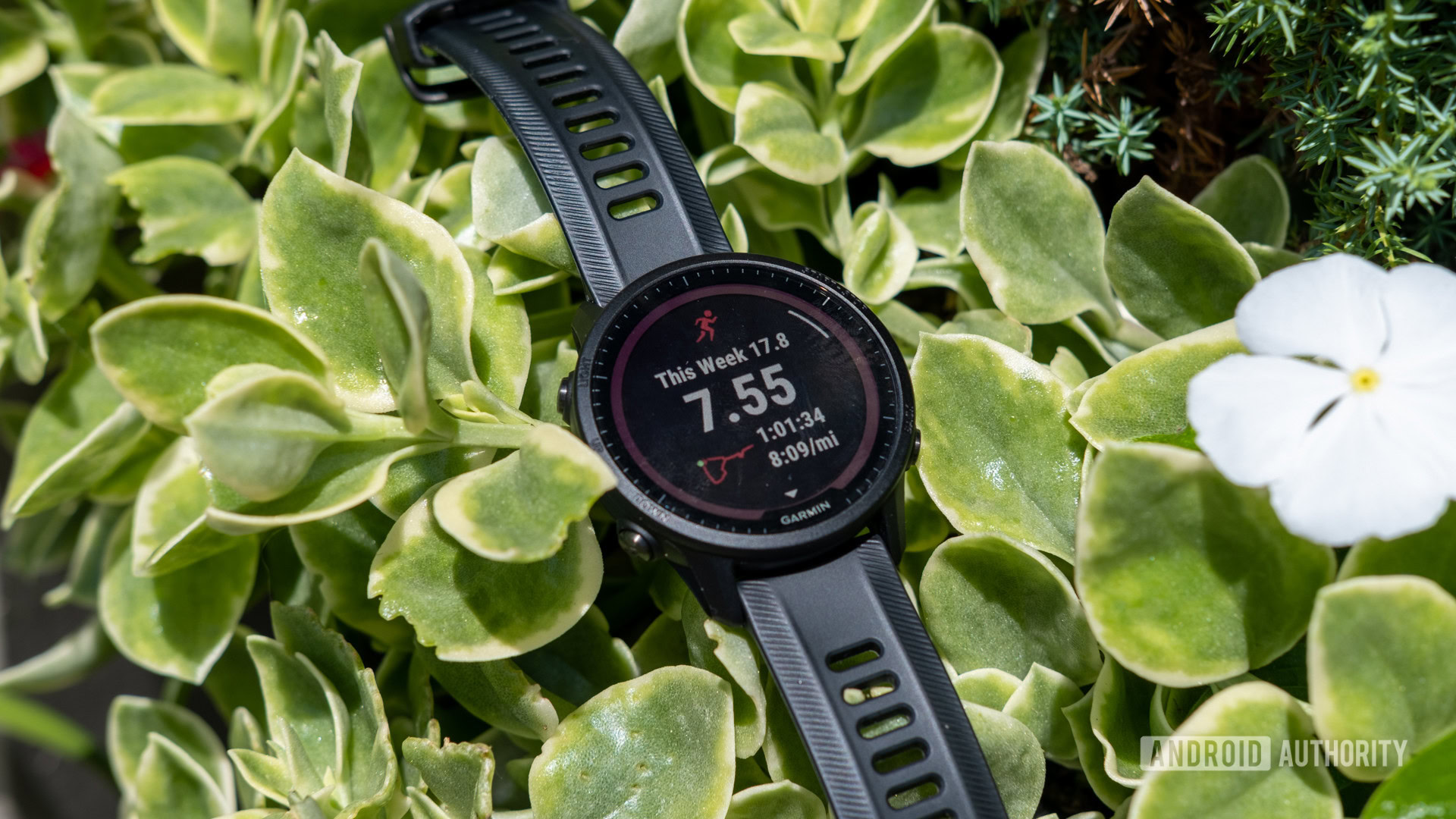
The Garmin Forerunner 955 — particularly the Solar version — is, in my opinion, the best GPS watch on the market. It’s probably overkill for most users, but you won’t find many areas where this premium wearable comes up short. If the Forerunner 255 is the standard trim package, the Forerunner 955 and 995 Solar are the premium moonroof with heated massage seats and enhanced audio. It’s easy to use and recommend for Android and iOS users, and the watch rewards you the more you expand your fitness horizons.
Garmin’s 1.3-inch display is just the right size to track notifications and follow turn-by-turn directions on your long runs or rides. The Solar version’s enhanced battery life is also excellent, especially if you can reach the recommended three hours of direct sunlight each day. Overall, the Forerunner 955 pulls virtually no punches, with a touchscreen, traditional buttons, and upgraded sensors throughout. It’s easy to crown it as a king among fitness wearables, but you’ll have to pay a hearty ransom. Neither price ($499 for standard, $599 for Solar) is cheap, but at least the price hasn’t climbed from the previous generation.
Garmin has also released a newer version, the Forerunner 965 ($599.99 at Garmin), which swaps the MIP display for an OLED panel. It picks up a titanium bezel, too, though there’s no more option for solar charging. That said, the Forerunner 965 is unchanged from the 955 under the hood, so it might not be worth the upgrade unless you need the brighter display. Thankfully, the OLED swap doesn’t have much impact on the watch’s battery life.
Garmin’s more affordable Forerunner 265 ($449.99 at Garmin) is worth a look, too. It launched alongside the Forerunner 965, and picks up the same OLED panel. Like the previous Forerunner 255 and 955, there are a few omissions — most notably the onboard mapping feature — but you get a similar suite of sports and workout types. The Forerunner 265 now packs a touchscreen, too, as well as onboard music storage on all models. You can tap into Garmin Pay as well, thanks to NFC support. It’s also a great watch for smaller wrists as it comes in 42mm and 46mm versions.
The Forerunner 955 and 955 Solar offer more than most people need, but they reward those willing to dig deep into Garmin's tracking features and activity modes.
While the Garmin Forerunner 955 is an excellent fitness watch with plenty of bells and whistles, it’s not alone at the top end of the spectrum. The $499-$599 price tag means it’s positioned against some of the best fitness watches around. It sits closest to the Coros Apex 2 Pro ($499), which also offers offline mapping and remarkable 30-day battery life — even without solar charging. The Suunto 9 Baro ($599) comes in a few different configurations, with stainless steel or titanium cases. It also offers more than 80 sport modes and up to 100 meters of water resistance. Polar’s Grit X Pro ($499) is a relative newcomer on the scene, but it packs 40 hours of GPS battery life and military-grade durability for temperatures as low as -20°C (-4°F).
If you’re planning to spend most of your adventures offroad, you may want to look at a more rugged fitness watch. However, the Forerunner 955 packs many of the same features at a lower price. Garmin’s own Fenix 7 ($699.99 at Amazon) can set you back up to $1,000 with the most expensive models, but it comes in three case sizes and offers an optional Solar Sapphire version with tougher glass and a familiar solar charging ring. The Coros Vertix 2 ($699 at Amazon) is a bit more affordable, with up to 60 days of battery life, though the size might be prohibitive for some smaller wrists.
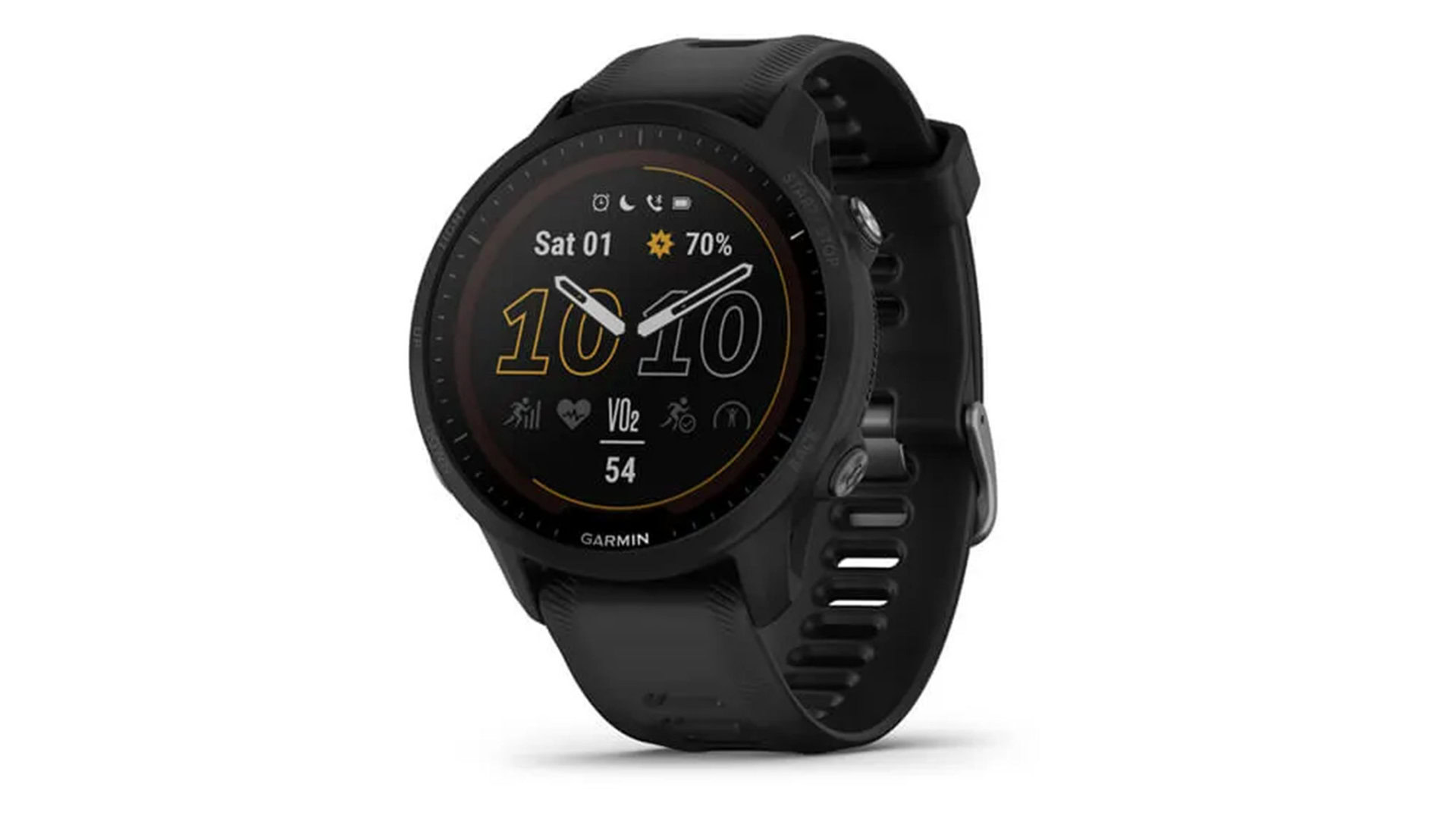
Garmin Forerunner 955 Solar top questions and answers
The Garmin Forerunner 955 Solar is rated for 5ATM water resistance, which means you can submerge it in up to 50 meters of water without issue.
No, the Garmin Forerunner 955 Solar cannot make calls. You can see notifications on the watch, but it does not have a microphone for calling.
Yes. The Garmin Forerunner 955 series supports interchangeable quick-release bands, though it does not include a set in the box. It’s sized for 22mm bands.
The Forerunner 955 is Garmin’s premium GPS watch, with a touchscreen, onboard mapping, and optional solar charging. The Forerunner 255 is more affordable, and offers two different case sizes with optional music controls, but many of the same sport and workout modes.
Thank you for being part of our community. Read our Comment Policy before posting.